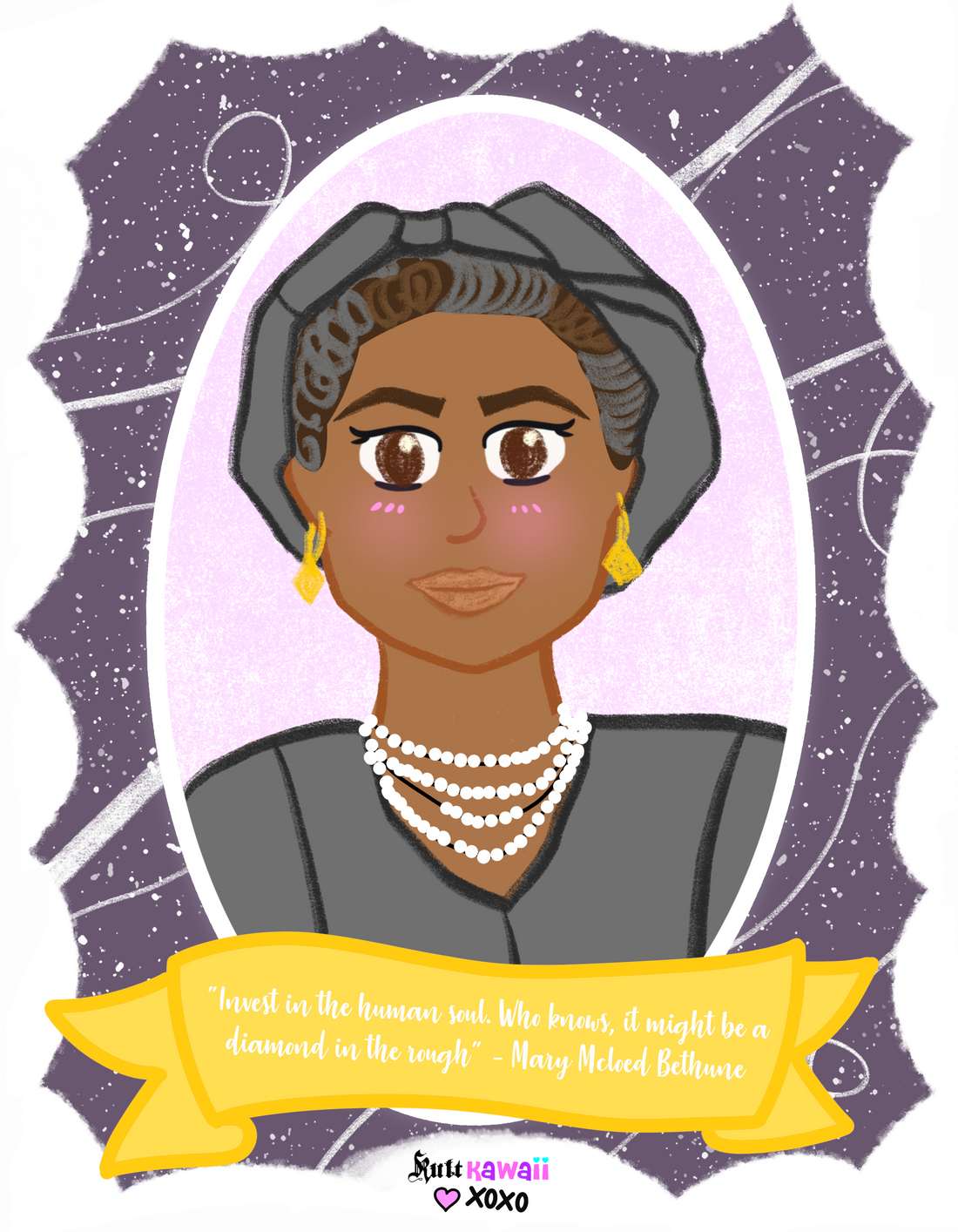
Mary McLeod Bethune: The Educator Who Changed the Game
When we talk about trailblazing women, Mary McLeod Bethune is one of those fierce, unstoppable forces who truly changed the world. An educator, civil rights leader, and advisor to several U.S. presidents, Bethune was determined to make sure that Black women and children had access to education and opportunities that were often denied to them. But did you know she started her journey with just a dollar and fifty cents? Let’s dive into the life of this inspiring woman with some fun and fascinating facts that show just how incredible she was!
Bethune Opened Her Own School with $1.50 and a Dream! Mary McLeod Bethune’s story begins with a humble but powerful dream—to provide education for young Black girls. Armed with just $1.50, unwavering faith, and a whole lot of determination, she opened the Daytona Literary and Industrial School for Training Negro Girls in 1904. The school started with only five girls (and her own son), a rented space, and homemade desks.
Bethune believed that education was the key to uplift Black communities. Her school began to grow, merging with the Cookman Institute for Men in 1923, eventually becoming what we now know as Bethune-Cookman University. Her vision didn’t stop at education; she wanted to ensure that her students were prepared for every aspect of life—academic, vocational, and spiritual.
Fun Fact: Mary often sold homemade pies and raised funds from the local community to keep her school running!
Adviser to Four U.S. Presidents
Bethune wasn’t just a force in education—her leadership caught the attention of the highest office in the land. She served as an advisor to FOUR U.S. presidents, most notably Franklin D. Roosevelt. Bethune was appointed to several influential roles, including as the head of the Division of Negro Affairs of the National Youth Administration (NYA) in 1936, making her one of the highest-ranking African American women in government at the time.
She was also part of FDR's "Black Cabinet," a group of African American leaders who advised the President on issues facing Black communities. In these roles, Bethune was a tireless advocate for civil rights, economic opportunities, and the education of Black youth.
Fun Fact: During her time with the NYA, she created thousands of jobs for Black youth, helping to reduce the devastating impact of the Great Depression on African American families.
Founded the National Council of Negro Women
Bethune wasn’t satisfied with her own success; she wanted to lift up an entire generation of Black women. So in 1935, she founded the National Council of Negro Women (NCNW) to promote leadership, advocacy, and unity among Black women. The organization fought for civil rights, educational advancements, and equality in the workplace.
Bethune believed that if Black women could organize, they could change the world—and she was right! Today, the NCNW is still active, focusing on empowering women of color and advocating for racial justice and economic equality.
Fun Fact: The NCNW’s slogan was “Unity of Purpose and Action,” and Bethune herself embodied this motto in everything she did!
She Had Her Own White House Office—Talk About VIP Status!
When Franklin D. Roosevelt was President, Mary McLeod Bethune was given her very own office in the White House. As the director of the NYA’s Division of Negro Affairs, Bethune was at the heart of policymaking, ensuring that young Black Americans had access to vocational training and job opportunities during the New Deal.
She was a close friend and confidante of Eleanor Roosevelt, too, with whom she worked on numerous civil rights initiatives. Bethune’s presence in the White House was a powerful symbol of her influence and the respect she commanded at the highest levels of government.
Fun Fact: Bethune famously said, “The true worth of a race must be measured by the character of its womanhood.” With her, that measurement was off the charts!
The First Black Woman to Have a Monument in Washington, D.C.
Even after her passing in 1955, Bethune’s legacy continues to inspire. In 1974, she became the first Black woman to be honored with a statue in a public park in Washington, D.C. Her monument stands in Lincoln Park, and it’s a testament to her lifelong dedication to education, racial equality, and empowerment for Black women.
The inscription on the monument reads, “I leave you love,” part of Bethune’s famous last will and testament to her people. It’s a reminder of her unbreakable spirit and her belief in love, unity, and progress.
Fun Fact: The statue shows Bethune handing off her legacy to two children—symbolizing the torch she passed on to future generations of leaders.
Why Mary McLeod Bethune's Legacy Matters Today
Bethune’s influence continues to resonate in education, civil rights, and leadership today. She was a woman ahead of her time who believed that with the right opportunities and a strong foundation in education, anything was possible. Her legacy lives on in Bethune-Cookman University, the NCNW, and the countless lives she touched through her work.
So, whether you're a student, an educator, or simply someone inspired by powerful women, take a moment to appreciate the incredible life of Mary McLeod Bethune. She taught us that big dreams, dedication, and a little bit of pie-making can truly change the world!
Want More Mary McLeod Bethune?
We could talk about her accomplishments all day! From her close relationship with the Roosevelt family to her work in founding the NCNW, Mary McLeod Bethune's impact is still felt today. Dive deeper into her story and get inspired by her leadership and vision.
This post celebrates Bethune’s journey, but there’s so much more to learn! Ready to find out more about other trailblazing women in history? Stay tuned to our blog for more inspiring stories.
Fun Fact Bonus: Bethune always kept her door open for those in need. She famously said, “Invest in the human soul. Who knows, it might be a diamond in the rough.”

1 comment
Great info and a fun blog!